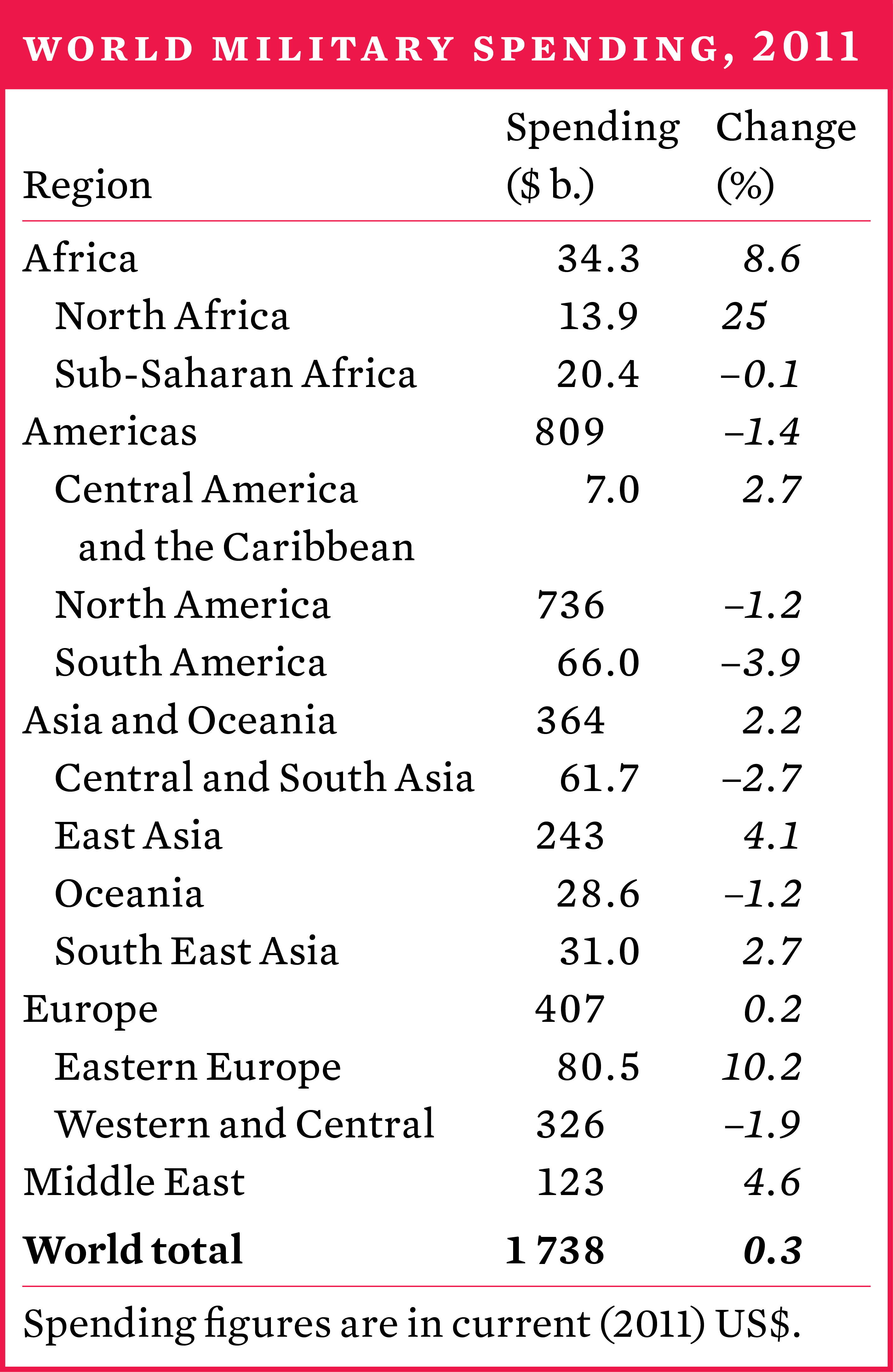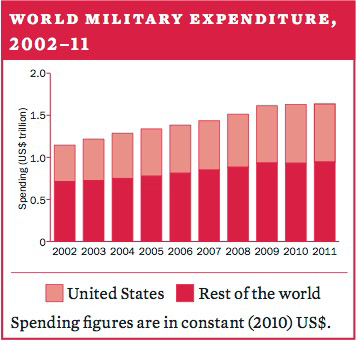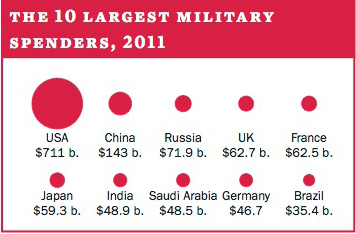4. Military expenditure
Overview, Sam Perlo-Freeman [PDF]
I. Global developments in military expenditure, Sam Perlo-Freeman and Carina Solmirano [PDF]
II. The economic cost of the Afghanistan and Iraq wars, Sam Perlo-Freeman and Carina Solmirano [PDF]
III. The United States’ military spending and the 2011 budget crisis, Elisabeth Sköns and Sam Perlo-Freeman [PDF]
IV. Military expenditure in Africa, Olawale Ismail and Sam Perlo-Freeman [PDF]
V. Europe and the impact of austerity on military expenditure, Sam Perlo-Freeman [PDF]
VI. The reporting of military expenditure data to the United Nations, 2011, Noel Kelly [PDF]
VII. Military expenditure data, 2002–11, Sam Perlo-Freeman, Olawale Ismail, Noel kelly, Elisabeth Sköns, Carina Solmirano and Helen Wilandh [PDF]
Summary
World military expenditure did not increase in 2011, for the first time since 1998. The world total for 2011 is estimated to have been $1738 billion, representing 2.5 per cent of global gross domestic product or $249 for each person. Compared with the total in 2010, military spending remained virtually unchanged in real terms. However, it is still too early to say whether this means that world military expenditure has finally peaked.
The main cause of the halt in military spending growth was the economic policies adopted in most Western countries in the aftermath of the global financial and economic crisis that started in 2008. These policies prioritized the swift reduction of budget deficits that increased sharply following the crisis.


The impact of austerity on military expenditure in Europe
In Western and Central Europe in particular, governments enacted austerity measures, including military spending cuts. In countries such as Greece, Italy and Spain, deficit reduction was given added urgency by acute debt crises where these countries faced being unable to meet their debt obligations, in some cases requiring bailouts from the European Union and the International Monetary Fund.
The falls in military expenditure brought other policy debates into focus, including long-standing accusations from both sides of the Atlantic that European countries are failing to ‘pull their weight’ in military affairs, and renewed efforts to promote greater European military cooperation as a way to reduce costs while preserving capabilities.

US military spending and the 2011 budget crisis
The US administration and the Congress attempted to agree measures to reduce the soaring US budget deficit. While these attempts did not lead to substantive cuts in military expenditure, delays in agreeing a budget for 2011 contributed to spending being lower than planned and resulted in a small real-terms fall in US military expenditure.
The rapid decade-long increase in US military spending appears to be ending. This is the result both of the ending of the Iraq War and the winding down of the Afghanistan War and of budget deficit-reduction measures.
The economic cost of the Afghanistan and Iraq wars
One of the dominating factors of the global security environment over the past 10 years, and a key factor influencing military spending in many countries, was the ‘global war on terrorism’ following the terrorist attacks on the USA of 11 September 2001. The highly militarized policy response to these attacks chosen by the USA, which included invasions of Afghanistan and Iraq, had cost the USA over $1.2 trillion in additional military expenditure alone by the end of 2011, and may result in total long-term costs of as much as $4 trillion. Much lower, although still substantial, costs had also been incurred by other participants in these wars.
The reporting of military expenditure data to the UN
The number of states reporting to the UN Standardized Instrument for Reporting Military Expenditures has dropped from a high of 81 in 2002 to 51 in 2011.
European states had the highest reporting rate in 2011 (31 of 48 states). The worst rates were in Africa (2 of 54 states) and the Middle East (1 of 14 states).
The wars in Afghanistan and Iraq have also led to huge economic costs, including costs of military forces; destruction of capital and infrastructure; disruption of normal economic activity; loss of human capital through death, injury, displacement and disruption to education; and loss of foreign investment and tourism. Full estimates for these costs are not currently available.
Military expenditure in Africa
Africa was the region with the largest increase in military spending in 2011—8.6 per cent. This was dominated by a massive 44 per cent increase by Algeria, the continent’s largest spender. Algeria’s continuous increases in recent years were fuelled by increasing oil revenues and were provided a ready justification by the activities of al-Qaeda in the Islamic Maghreb (AQIM), although Algeria’s regional ambitions may be a more important motive.
The terrorist activities of Boko Haram were also a major security concern for Nigeria and the military-led response to these appears to have been one factor in Nigeria’s military spending increases.However, the role of other factors, especially oil revenues, should not be ignored.